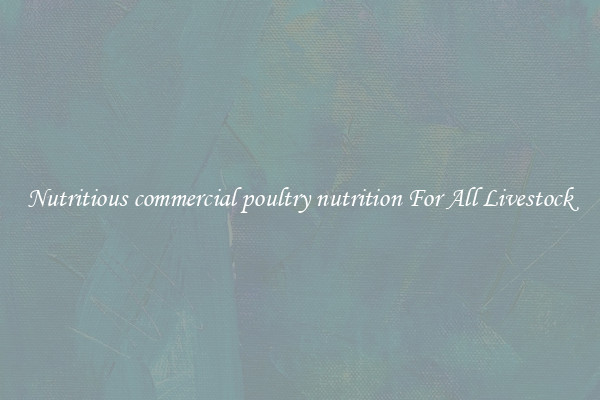Nutritious commercial poultry nutrition For All Livestock
Nutritious Commercial Poultry Nutrition for All Livestock

When it comes to commercial poultry nutrition, the focus is not only on feeding the chickens, but also providing them with a balanced and nutritious diet that promotes optimal growth and health. This is crucial because healthy livestock results in better productivity and higher profits for farmers.
Protein is a key component of poultry nutrition, as it helps with muscle development and promotes growth. Most commercial poultry feeds contain a combination of plant-based ingredients such as corn, soybean meal, and wheat, which are rich in protein. In addition to plant-based proteins, some feeds also include animal-derived proteins for added nutritional value. These feeds are carefully formulated to meet the protein needs of the poultry at different stages of their life cycle, from chicks to adult birds.
Apart from protein, poultry also require carbohydrates for energy. The main source of carbohydrates in commercial poultry feeds usually comes from grains like corn, wheat, and barley. These grains are also rich in essential nutrients such as vitamins and minerals, which are vital for the overall health of the birds.
Vitamins and minerals play a crucial role in poultry nutrition as they support various physiological functions and promote disease resistance. Poultry feeds are fortified with essential vitamins like vitamin A, D, E, and B-complex, as well as minerals like calcium and phosphorus. These nutrients are essential for bone development, eggshell quality, and overall growth.
Another important aspect of commercial poultry nutrition is the inclusion of fats and oils in the feed. Fats provide a concentrated source of energy and help with the absorption of fat-soluble vitamins. Additionally, they are valuable for enhancing the palatability and flavor of the feed.
Commercial poultry feeds are carefully formulated to provide a well-balanced and complete diet for the birds. This ensures that they receive all the necessary nutrients in the right proportions, allowing them to grow efficiently and maintain good health. However, it is important to note that nutritional requirements may vary depending on factors such as breed, age, and intended use of the poultry.
To maximize the benefits of commercial poultry nutrition, farmers should follow proper feeding practices. This includes providing the right quantity of feed based on the age and size of the birds, ensuring access to clean water at all times, and regularly monitoring the flock's growth and health. Additionally, it is essential to store the feed in a cool and dry place to maintain its nutritional value.
In conclusion, nutritious commercial poultry nutrition is essential for the healthy growth and development of all livestock. By providing a well-balanced diet that meets the nutritional needs of the birds, farmers can ensure optimal productivity and profitability. Proper feeding practices and regular monitoring are key to maintaining a healthy flock and reaping the benefits of commercial poultry nutrition.

View details

View details

View details

View details








